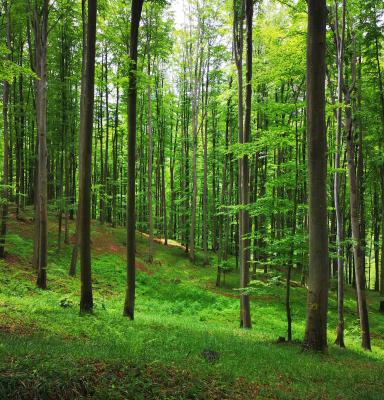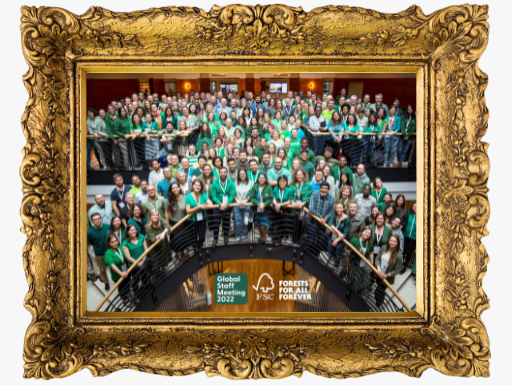
First FSC certificates issued (forest management certificate in Mexico; chain of custody certificate in USA).

FSC will promote environmentally appropriate, socially beneficial, and economically viable management of the world’s forests.
The true value of forests is recognised and fully incorporated into society worldwide. FSC is the leading catalyst and defining force for improved forest management and market transformation, shifting the global forest trend towards sustainable use, conservation, restoration, and respect for all.
FSC provides a system for voluntary accreditation and independent third-party certification. This system allows certificate holders to market their products and services as the result of environmentally appropriate, socially beneficial and economically viable forest management. FSC also sets standards for the development and approval of FSC forest management standards which are based on the FSC Principles and Criteria. In addition, FSC sets standards for the accreditation of certification bodies that certify compliance with FSC’s standards.
The FSC system is organised on a several planes. Below you will find an overview of the main structures. Learn more about it by referring to the document FSC Network Policy which may be downloaded from the Document Centre.
FSC is a democratic organization that is governed by its members. Members may join as an individual or as an organisation. They join one of three chambers – environmental, social, or economic – which are further divided into northern and southern sub-chambers. FSC’s unique governance structure aims to ensure that all decisions are made through consensus.
The FSC International Board of Directors is made up of 12 members elected by the full membership of FSC International. Four members are elected from each of the environmental, social, and economic chambers. Board members are elected for a four-year term and are accountable to FSC’s international members.
They are responsible for:
The FSC International Board appoints the Director General and sets and evaluates their annual KPIs.
The FSC International Secretariat is responsible for:
FSC International is located in Bonn, Germany.
FSC Network Partners are legally independent FSC partner organisations that promote the responsible management of the world’s forests on behalf of FSC. Network Partners have a governance structure that mirrors that of FSC International: they have a membership in three chambers that elects a board of directors with balanced representation of environmental, social, and economic stakeholders; and they have their own statutes which may involve certain legal, operational, and governance obligations that differ from country to country. Network Partners represent FSC at the national level.
Network partners may be responsible for some of the following activities:
The work of each Network Partner is different and is reflected more specifically in the individual agreements made between FSC International and a Network Partner. Much depends on the situation in each of the countries, the existing opportunities, and the particular areas of focus important to the Network Partner.
Currently there is over 40 network partners around the word.
The FSC Statutes are the documents that govern the organisation and the foundation on which it was formed.
They are updated every three years, through a motion proposed by members at the General Assembly, or if an amendment is required between assemblies, this can be proposed by members through a postal vote.
Three decades ago, the 1992 Earth Summit in Rio failed to produce an agreement to stop deforestation. In response, a committed group of businesses, environmentalists and community leaders banded together to create a revolutionary concept: a voluntary, market-based approach that would improve forestry practises worldwide. That meeting marked the birth of the Forest Stewardship Council. 28 years ago we pioneered certification for responsible forestry, and we remain the most trusted responsible forest management solution thanks to our committed and diverse stakeholders.
First FSC certificates issued (forest management certificate in Mexico; chain of custody certificate in USA).
FSC is established as a legal entity in Mexico.
First certified and labeled FSC product, a wooden spatula, becomes available in the UK.
Held every three years, the general assembly is the top FSC platform for decision-making. All members of the three FSC chambers – social, environmental, and economic – come together to shape the future of forest management. Learn more about our international membership here.
Re-location of the FSC secretariat from Oaxaca, Mexico to Bonn, Germany.
40 Million hectares of certified forest globally and over 20,000 FSC-certified products on the market.
Standards for small or low-intensity managed forests (SLIMF) come into force after two years of development. In order to reduce the cost and complexity of certification for small (100 ha or smaller) or low intensity forest management units, eligible forest managers can apply for SLIMF, thus ensuring further financial and managerial benefits. Learn more about SLIMF forest management certification here.
Accreditation Services International GmbH (today Assurance Services International, ASI) is created to manage the FSC accreditation program.
FSC does not issue certificates itself. Independent certification bodies carry out the forest management and chain of custody assessments (audits) that lead to FSC certification. The certification bodies are held to account by the accreditation body Assurance Services International which regularly controls the work of certification bodies. Learn more about the accreditation process here.
FSC is not restricted to products on a store shelf. An entire construction project for example may be eligible for FSC certification. This kind of certification allows the project owners to use the FSC trademarks for the promotion. Read more about project certification here.
Controlled wood is uncertified material that can be mixed with FSC-certified material in products that carry the FSC MIX label. Controlled wood does not come from FSC-certified forests. Read more about controlled wood here.
The new strapline - Forests For All Forever - reaffirms the FSC vision of saving the world’s forests for future generations, while the visual identity, which includes the animals and people who live and interact in forests, reinforces the all-encompassing approach FSC takes to responsible forest management.
Ecosystem services are the benefits that people obtain from nature. In FSC-certified forests, valuable ecosystem services are protected – and in 2018, FSC introduced a procedure to demonstrate and communicate about the positive impact of responsible forest management on ecosystem services. Learn more about verification of ecosystem services here.
FSC celebrates 25 years of responsible forest management.
Over 199 000 000 hectares certified and over 37 000 CoC certificates globally.
After two decades of steady growth and development of FSC certification in Bosnia and Herzegovina, Croatia, Serbia and Slovenia, FSC International has officially started a new project with the aim of supporting the certificates holders and other interested stakeholders. Learn more about the FSC certification in the Adria-Balkan Region here.